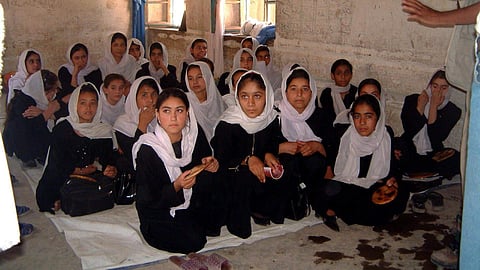
- News
- Campus
- Exam
- Podcast
- Web Stories
- Do You Know
- Path Finders - UG Programs
- Videos
- Book Review

Ever since it came to power in Afghanistan in 2022, the Taliban regime in the country has systematically reduced the number of avenues to education for female students. For them, the only option left for them, however, is religious schools.
The Taliban has been establishing a vast network of religious institutions that support a new alternative since it initially barred women and girls from secondary school, and higher education more than four years ago.
The Guardian reports that by the end of last year, there were over 21,000 Islamic madrasas, or religious schools, in Afghanistan. In 11 provinces, the Taliban constructed or established the groundwork for around 50 new madrasas between September 2024 and February 2025.
Mullahs (Islamic scholars), who are paid by the education ministry, operate the schools in the mosque or in their houses. The ministry has granted teaching credentials to 21,300 former madrasa students, enabling them to teach at the high school, undergraduate, and even postgraduate levels at universities, in order to staff the schools.
Due to the exclusion of girls from secondary education, families have few other options and are frequently pressured or encouraged to send their children — especially daughters — to religious schools.
According to The Guardian, attendance at these religious schools also comes with promises of incentives. As community leaders and mediums for aid, Mullahs who run these schools wield enormous power over most people’s daily lives, and often promise families aid in exchange for their children’s attendance.
Conversely, families that refuse to send their children to madrassas get no aid. As a result, community norms are gradually changing. Families that don't comply risk starvation and isolation. Those who agree frequently see their daughters return home with more dogmatic views, perhaps calling their own parents "infidels." Reports indicate that households whose girls attend religious classes are the only ones eligible for employment opportunities.
Afghanistan's labour market is also changing as a result of the growth of madrasas. Teenagers with only madrasa credentials are replacing civil servants with years of training.
Girls no longer aspire to be engineers or doctors as a result. Rather, they believe that madrasa diplomas are more secure and are becoming the sole qualification that matters.
